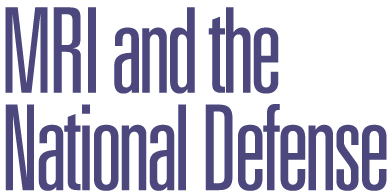
From the looks of things one would never guess the critical role in our
national life that the Midwest Research Institute is currently playing.
The nicely remodeled MRI headquarters, which nestles quietly amidst the
surrounding campus of UMKC, provides no visible signs of urgency. Its
Web site cheerily describes MRI’s efforts in improving the nation’s
health, its environment, its agriculture and food safety— all true
enough—but likewise has not a whiff of the fife and drum about it,
not a hint of national emergency.
Yet for all its pleasant reticence, for all its soft views of the shuttlecocks
across Brush Creek and down the Nelson-Atkins mall, MRI is deeply engaged
in the nation’s war against terrorism, an engagement that has been
ratcheted up significantly in the harrowing days after Sept. 11. Indeed,
requests for help have been coming in steadily to MRI since that fateful
day from sources both public and private, although now about 75 percent
of MRI’s total funding comes from the federal government.
One such request came directly from the nation’s capital. Soon after
the attack on the World Trade Center and the Twin Towers, someone still
unknown sent a sample of bacillus anthrasis, more commonly known as anthrax,
to Sen. Tom Daschle’s office in Washington. Given its experience
in chemical and biological defense—the Institute is certified by
the Centers for Disease Control and Prevention and by the U.S. Army to
conduct research in defending against chemical and biological weapons—MRI
was tapped to provide technical support to deal with the bioterrorist
threat. And, as always, the Institute responded.
Kansas Citians got some hint of MRI’s capabilities when anthrax made
its first unwelcome appearance at a postal service facility here in town.
MRI’s scientists and technicians were able to provide valuable detection
and analysis service not only for the Post Office but also for the other
organizations in town that feared that anthrax might have been sent their
way. Fortunately for Kansas City, MRI has a strong background in the development
and use of detection devices for biological or chemical agents.
The anthrax defense is just one of the many efforts the scientists at
MRI have been called to make. On another, related front, its scientists
have taken up the challenge of developing vaccines to combat the threat
posed by biological agents. "This is an excellent opportunity for
us to use our skills and experience in solving one of science’s most
urgent problems," says John Phillip, Ph.D., director of MRI’s
Pharmaceutical Product Development Division. "We see vaccine development
as a logical extension of the services we offer."
In fact, MRI has a long-standing commitment to conducting research in
the development of new pharmaceuticals and other products to improve the
quality of life. The Institute has also involved itself deeply in Kansas
City’s emerging life-sciences initiative.
Like much of the work MRI is doing on the anti-terrorism front, its work
on vaccines has the potential for long-term benefits when war is no longer
the issue. "In reality," says Phillip, "this research and
development feeds back in improving the health of everybody." Ironically,
war has often spurred the development of life-saving health-care advances.
Vaccines are particularly important right now not only because of the
threat of biological warfare employing viruses and bacteria, but also
because war and other international disorders require the presence of
people in parts of the world where viral diseases are common but effective
antibiotics are not.
MRI has as a top priority making vaccines that are as safe and as effective
as possible. Phillip sees in the cloud of war a silver lining, a "huge
opportunity to take us further in our quest," a quest for the improved
health of the community at large.
In another significant development related to the war on terror, MRI has
opened a new facility, the National Capital Region (NCR) Laboratory in
Rockville, Md. The purpose of the lab is to provide expanded services
in the disciplines of biological and chemical defense. The NCR lab will
support a wide range of scientific and technical services focused on molecular
biology, genetics, microbiology, immunology and chemistry.
"MRI has been serving the government in the area of biological and
chemical defense for many years from our Kansas City and Palm Bay, Fla.,
laboratories," says Andrea Hall, MRI senior vice president. "This
new facility will bring our capabilities literally to the front door of
several key MRI clients."
MRI brought the new lab on line primarily to assist two other government
labs meet an increased workload in sample analysis since Sept. 11. These
two military labs had been responsible for providing several government
clients around the clock sample analysis for a variety of biological threats.
The Program Executive Office for Chemical and Biological Defense has contracted
with MRI to move much of this work to MRI’s Rockville facility. This
transition will allow the two labs to return to their primary mission
areas.
As with so much of its work post-Sept. 11, MRI found itself in the role
of getting the facility opened and on line in, what John Phillip calls,
"lightning-fast time." Once again, MRI did not disappoint.
"At the moment," says Phillip of the lab in particular and the
war on terrorism in general, "MRI is demonstrating its capacity,
flexibility and quick response."